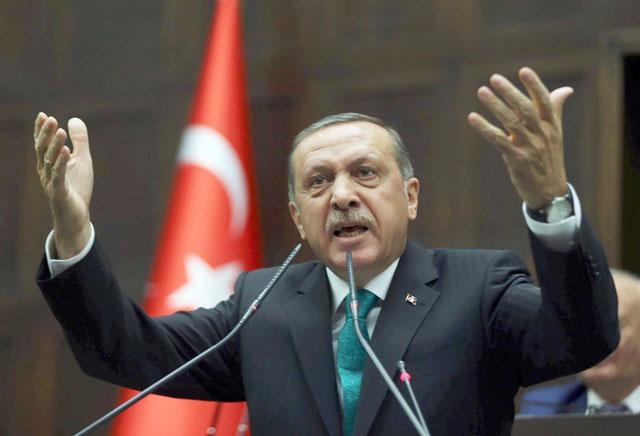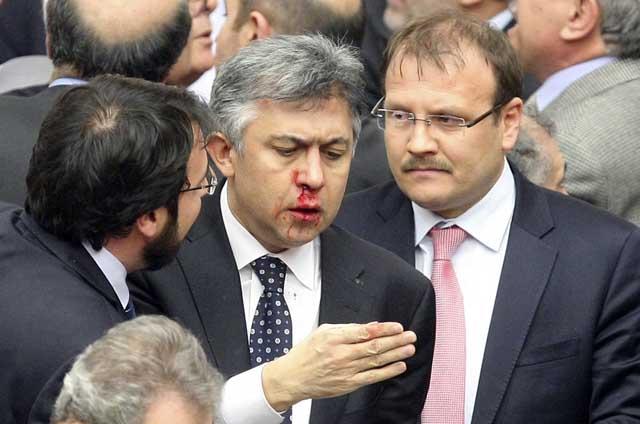You are here
Erdogan tells Turkish ambassadors to spread word of ‘treacherous’ plot
Jan 15,2014 - Last updated at Jan 15,2014
ANKARA — Prime Minister Recep Tayyip Erdogan ordered his ambassadors on Wednesday to confront allies with the “truth” that a graft investigation shaking Ankara was the result of a foreign-backed plot to sabotage Turkey’s international standing.
Erdogan, visiting Brussels next week, also mockingly rejected European Union expressions of concern about his moves to tighten control over a judiciary he sees as central to the conspiracy. His finance minister said political turbulence may hinder Turkey in reaching a 4 per cent growth target this year.
What erupted a month ago as a corruption inquiry involving the sons of three ministers and businessmen close to the government has grown into one of the biggest challenges of Erdogan’s 11-year rule and damaged Turkey’s image abroad.
Erdogan said politicians, domestic and foreign media, and financiers were conspiring against Turkish interests.
“We expect you to exert more effort to defeat this treacherous operation targeting Turkey by telling our partners the truth,” Erdogan told the conference of Turkish ambassadors in the capital Ankara.
Details of the corruption allegations have not been made public, but are thought to relate to construction and real estate projects, and Turkey’s gold trade with Iran.
Erdogan’s supporters see US-based Turkish cleric Fethullah Gulen — a former ally whose network of followers is influential in the police and judiciary — as a prime mover in a plot backed by foreign collaborators.
“They are trying to deal a heavy blow to Turkey’s economy. They are making efforts to push interest rates higher. In order to make international investors uneasy, they use every means.
“Most importantly they are working hard to harm Turkey’s image in the world,” Erdogan said.
He has responded by purging the police of hundreds of officers and seeking tighter control over the appointment of judges and prosecutors, raising alarm in Brussels in particular, which has been engaged in years of protracted EU membership negotiations with Ankara.
EU enlargement commissioner Stefan Fule told Turkey’s new EU minister Mevlut Cavusoglu in their first meeting this week that any changes to the judiciary must not call into question Turkey’s commitment to meeting EU membership criteria.
Erdogan rejected such concerns.
“I’m sorry but we won’t be taken in by evaluation like ‘this is contrary to the European Union acquis’. We know how to read and write. We can see what is going on,” he said.
Economic fallout
Erdogan’s AK Party has proposed a draft bill giving government more say over the High Council of Judges and Prosecutors (HSYK), which makes top judicial appointments, a move the opposition says would violate the constitution and sees as an attempt to stifle the corruption investigation.
President Abdullah Gul, who would have to ratify the bill, called for compromise on Wednesday, saying Turkey’s rival political parties should instead agree on changes to articles in the constitution governing the judiciary.
“There is agreement among the parties that there should be an HSYK which is independent and impartial and within the framework of EU principles,” Gul said, adding prospects for a deal should become clear within a couple of days.
But the main opposition CHP said it would only negotiate if Erdogan withdrew the draft bill first, while a senior AK Party official said he was not optimistic of reaching a compromise.
The feud has shaken investor confidence and raised questions about the credibility of Turkey’s institutions, helping drive the lira — already battered by waning investor appetite for emerging markets — to historic lows.
Finance Minister Mehmet Simsek said the political turbulence was among factors which could prevent Turkey reaching its target of 4 per cent economic growth this year.
“It makes investors tense both domestically and abroad. This tension will be reflected in consumption and investment decisions,
and hence in growth,” he told a news conference.
Erdogan has overseen strong economic growth in Turkey since coming to power in 2002, transforming its reputation after a series of unstable coalition governments in the 1990s ran into repeated balance of payments problems and economic crises.
The AK Party’s reputation for economic management has been one of the cornerstones of its three successive election wins over the past decade, a record Erdogan wants to maintain in the run up to local elections in March and a presidential race which he is expected to contest in August.
Related Articles
President Abdullah Gul has dismissed suggestions that outside forces are conspiring against Turkey, openly contradicting Prime Minister Tayyip Erdogan’s assertions that a corruption scandal is part of a foreign-backed plot to undermine him.
Turkey’s government removed a series of high-profile prosecutors on Thursday stepping up a purge of a judiciary Prime Minister Recep Tayyip Erdogan considers embroiled in a plot to undermine him with specious corruption allegations.
Turkey’s parliament passed a bill Saturday tightening government control over the judiciary, with lawmakers violently scuffling over the contested reforms introduced amid a major graft scandal.


















